- Home
- Sara Shepard
The Elizas Page 20
The Elizas Read online
Page 20
“I want to go to the dorm.”
“I would never hurt you, you know that!”
“I want to go back to the dorm.”
Dot cried silently the whole way. Her mother probably thought she was angry, and she was, of course, but the tears were from loss, too. A story like that couldn’t be unremembered.
ELIZA
I AM QUAKING by the time I reach my parents’ curb. My heart galumphs, and I tumble out of the front seat and onto the sloped front lawn. The sky is a disarming shade of purple. Behind me, kids who have just climbed to the Hollywood sign are traipsing back to their cars. Their giggles sound like breaking glass.
At the door now, once again, I smell the cloying scent of orange perfume. I roll back my shoulders, readying myself. I consider ringing the doorbell, but instead I try the knob. It twists easily, and then it whips open without me moving a muscle. I jump. Gabby blinks at me from inside, letting out an oof.
“O-oh,” I blurt. “What are you doing here?”
Gabby’s mouth twitches into a smile. She’s in a black pantsuit and is carrying a red purse shaped like an anvil. “I came home early. I was just about to come get you, in fact.”
“Why?”
“Your follow-up appointment, remember? Didn’t I call you? I thought I was grabbing you at your house, but this is better. We’ll get there much faster.”
I narrow my eyes. “What follow-up appointment?”
“For the pool thing. Remember I said I’d take you?”
“Is it for an MRI?”
“I don’t . . .” She rummages in her bag and pulls out a reminder card. “No, it’s with someone named Doctor Sweitzer.”
“Who’s that?”
“Uh, a psychiatrist.” She says psychiatrist quickly, like I’ll gloss over it, and smiles hopefully.
I back away from the door. “I don’t need a shrink.”
Then Gabby notices my bruised face. “What happened?”
“Someone came up behind me and scared me. And I fell.”
“What?”
I reach for the door to shut it. “It’s why I need to talk to Mom right now, actually.”
“But Eliza, the appointment.”
“I’m not going!”
Gabby’s hands curl against her chest. The crystals on the chandelier above the dining room table tinkle together. I didn’t mean to yell that loudly.
“Look, I need to stay here.” I temper my tone. “I need to talk to Mom. It’s really important. I’m not leaving until I do.”
“She’s not here.”
I shrug and plop down on the slipper chair near the door. “Then I’ll wait.”
Gabby checks her watch, then shuts the front door and walks closer to me. “What do you need to talk to her about?”
She looks so dowdy in her baggy suit. People without style have always fascinated me. Is it that they don’t care? Does she think she actually looks good? I made so much fun of her as a teenager, but Gabby was begging for it. She wore Mary Janes with socks well into middle school, for God’s sake. And could she not have gotten cuter glasses? Now, of course, I regret it. If I had been nicer to Gabby, perhaps she’d be a sympathetic ear now.
“I think Mom knows something she’s not telling me,” I explain.
Gabby just stares at me for several ticks of the clock. “Knows . . . what?”
“I saw her in this alley behind a parking lot a few days ago, sort of near her work. I think she was following me. I had a panic attack and passed out, and by the time I woke up, she was gone.” I run my tongue over my teeth. “She deleted something off my phone, then left. Though I think she called the police to let them know I was back there. Nice of her, huh?”
Gabby looks astonished. “Are you sure it was Mom?”
I think of the fuzzy image of her face that had returned to me at the steak house. “Pretty sure.”
“What did she find on your phone?”
“Something . . . important. And the only way she’d even know I found the important thing was if she was following me. Something really weird is going on, Gabby.” I cut my gaze over to her. “Do you know what it is?”
“I don’t have a clue.” Gabby clears her throat. “Look, you’re going to hate me for saying this, but you sort of sound like how you sounded when you had the tumor. Always worried that someone was following you. That sort of thing.”
“I know this sounds the same, but it’s not. I have proof this time.”
“What kind of proof?”
“I remember Mom there,” I urge emphatically. “And I need to know why.” My mind has been racing ever since I made the connection. Why would my mother delete the list of numbers on Leonidas’s call screen? Is her number one of them? Is that the number I vaguely remember? It’s possible. I would have recognized our home phone number—it’s been the same since I was a kid—but I don’t have my mom’s cell memorized.
So was my mother talking to Leonidas that day outside the Cat Show? Was she sharing some sort of worry about Palm Springs and was he talking her down? But why? Because she’s guilty of something, obviously—it’s the only thing that makes sense.
I look at Gabby. “I think she knows who pushed me into the pool in Palm Springs. In fact, I’m sort of scared she pushed me into the pool in Palm Springs.”
Gabby smiles nervously. “Okay. That’s . . . interesting. But just—go with me here. Is it possible you’re blaming Mom because she’s the one who’s the most worried about you?”
I burst out laughing. “Mom hasn’t even called me since Palm Springs. The only time she’s spoken to me is to tell me that my book is crap. I wouldn’t call that worried.”
“She wants you to go back to the hospital. She’s desperate for you to get better, and—”
“Gabby, instead of waiting for me to regain consciousness,” I interrupt, “she ran off. She tampered with my phone then left me in an alley! When the cops came, they thought I was nuts!”
“—but an unhealthy part of your brain is trying to fight against that,” Gabby bulldozes over my words. “You’re not seeing things rationally. I mean, okay, even if Mom did run from you in a parking lot, clearly she knew you were okay, and you said yourself she called the cops just in case. Maybe she had a good reason to leave.”
My mouth drops open. “What could that possibly be?”
“Maybe she . . .” Gabby shuts her mouth tightly and looks away.
I feel a shiver down my spine. “Maybe she what?”
“I don’t know. Maybe she was late for something.”
I can tell this isn’t what Gabby was going to originally say, and I snort. Gabby walks across the room and looks out the window, her face hidden from view. “Eliza, I know she’s not all warm and fuzzy. Your illness has been hard on her. Some people rise to those occasions. Others . . . it tears them apart. They can’t handle it. It kills them, and they just crumble. She sees you acting strangely again, and it’s killing her.”
“Are you trying to get me to feel bad for her?”
“No. It’s just that . . . I don’t think you see it from her perspective. None of us can wrap our minds around what you were going through when you were sick. Yeah, she should have been there for you a little more, but she does care. I woke up many times in the night to find her crying in the bathroom. Or just down in the kitchen, sitting at the table, hands cupped around an empty coffee mug, just staring.”
I make a tsk sound. “She always acted like she’d had enough of me.”
“She’s one of those people who doesn’t know how to deal with tragedy. So she gets angry and distant. It isn’t the right response, but it’s just how she is.”
“It doesn’t change that she’s hiding something. I’m still going to sit here until she’s back.”
Gabby looks at her watch again. “I hate to break it to you, but I don’t think she’s going to be home for a while. She and dad have some sort of dinner thing tonight. You’ll be waiting a long time.” She stands. “So how about that app
ointment?”
“No appointment,” I say. “I’m not changing my mind.”
And then we stare at each other for a while.
“Okay,” Gabby relents. “We don’t have to go to the appointment. But let’s get out of the house. To get an early dinner, maybe. And then, afterward, I’ll bring you back here, and we’ll see if Mom is home then. Okay?”
I roll my jaw. It feels less satisfying, but I feel like if I say no, she’ll try to force me down the appointment road again. And to be honest, maybe I haven’t thought this through. I’m not sure if I’m ready for a confrontation with my mother. I want to ask her all sorts of questions, but she’ll never admit what she’s up to. She’ll twist it, somehow, and turn it into my problem, my illness—this is all a figment of my messed-up head. What I need is to prove it another way. I’m just not sure what that way is yet.
“Fine,” I say. “But you drive both of us. I’ll leave my car here.” That will force Gabby to bring me back, and maybe by then my mother will be home.
Her car, a beige PT Cruiser, is parked in the driveway. The inside of it smells like a vanilla candle. The seats have recently been vacuumed, and the footwells are clear of the wrappers and napkins and books and other bullshit that plague mine. I kick open the glove box when I climb into the passenger seat; her owner’s manual is neatly stowed away. A plastic Baggie labeled registration and insurance holds those two documents. I bet she’s the type who regularly gets her tires rotated.
I settle in the passenger seat, and Gabby swings next to me. There’s a flash in the rearview mirror. A person is standing on the road, hands on hips, dark hair floating around her face. I turn around and viciously study the street behind us, but the road is empty. Sweat prickles on my body. It’s that face again. My face.
“What?” Gabby asks, staring at me.
I look again, and of course the face is gone. “Nothing,” I say, trying not to sound breathless. “I just thought . . . Nothing.”
We start down the hill. I’m looking for a way into a conversation with Gabby, but I can’t think of the right starting note. She sits very straight when she drives, like there’s a book balanced on her head. Every few seconds, her phone buzzes with a text—I can see the bubbles appearing on her screen, then disappearing. Something else dings, too, something in her purse. “Do you need to get those?” I ask.
“It’s fine. I don’t like to text and drive.”
When we turn on Sunset, I sit up straighter. “Are we going to the Chateau?”
“The what?”
We whip past the Chateau Marmont without turning in. Undaunted, I point to Toi. “That place makes good Thai cocktails,” I sing out. “Virgin cocktails, I mean.”
She continues past it, too. At the end of Sunset, she pulls into the valet lane and gets out, hefting her purse on her shoulder. I get out, too, my gaze on the below-the-knees hem of her skirt. Here on Sunset, she looks even more matronly. A tattooed man wearing short shorts and no shirt ambles up the street, yelling at someone on his cell phone. A convertible full of leering Asian guys cruises by, thumping rap music booming from their speakers. Across the street, a bunch of girls are wearing dresses that barely cover their crotches. Gabby’s hair boings childishly.
Gabby saunters past a bunch of rock clubs and boutique hotels and five-star restaurants and walks into a place called, at first glance, Gravel, though actually it says Crave. Eat, heal, love, reads a large slogan over the window, and there’s a picture of an enormous, fruit-filled smoothie. It’s probably made out of pineapple, but the color reminds me of pus.
Inside, tranquil music is playing, and people are sitting quietly at tables. The only jarring sound is a blender, juicing. A hostess, pin-thin with ripped Pilates arms, glides over to an empty table and hands us menus printed on paper so thin I’m afraid just handling it will make it disappear. “This place is . . . nice,” I mumble.
“I come here for dinner sometimes,” Gabby says. “With friends from work.”
Everything on the menu has quinoa in it, and there’s not a single cocktail, not that Gabby would allow me to get one anyway. I put the menu down and look around. There is a man in the corner who’s got on the full Buddhist garb. He’s sitting with the most beautiful woman I’ve ever seen, blonde and tan, totally flawless skin. I prefer bars with hard-looking women, jowly, fast-talking actors, chain-smoking rock-and-rollers. I suppose this is where everyone comes if they want to remain preserved.
Gabby’s phone pings again, and I chuckle. “They keep you on your toes at work, huh?”
She checks it and places it facedown on the table again. “I suppose.”
“So how do you know so much about people’s reactions to children with illness, anyway?”
Gabby gives me a strange look. “What you said about Mom,” I remind her. “It was very . . . insightful.”
She fiddles with her chopsticks. “My boss’s son has leukemia. I’m sort of . . . dating him. My boss, I mean. Dave. Not Linus, his boy.”
“That’s great, Gabby. For how long?”
“Six months, two weeks, and five days.”
“What’s his son’s prognosis?”
“Fifty-fifty. Dave’s a mess about it. I’m not sure we should be together right now. His whole focus is on his son, which it should be. But I guess he needs something else. A . . . distraction.”
“Something that makes him happy.”
Gabby primly sips her water. “Maybe that’s why Mom was so into kite-surfing when you were sick. She needed an escape, too.”
Yes, but what a magical, picturesque escape, flying over the ocean on a kite. Is it terrible of me to wish she’d chosen a hobby that was a little gloomier? “I guess I wanted you to suffer as much as I was,” I say.
“No. But people show suffering in different ways. And in your case and your mom’s case, maybe you didn’t see the extent of it, but I’m also not sure you’re being fair to her.”
I sniff. “And why would you say that?”
“Because . . .” Gabby looks away sharply. Red splotches appear on her cheeks. “Well, you don’t remember how it was.”
I sit back. “What do you mean?”
Her mouth grows very small, a perfect little button. I’ve seen the look on her before, when we were teenagers and she once blurted out the word fuck at the dinner table—something so old-hat for me, but a word I didn’t even know she knew. “Let’s just leave it at that, okay?”
Fury flares inside me. “No. I’m not leaving it at that. What do you mean? People are hiding things from me. Big things. I want to know what’s really going on.”
When Gabby looks up again, her expression is strangely sad. “Oh, Eliza.” But before she can say anything else, her phone rings. She looks down at it, lowers her shoulders, and shuts her eyes. “I need to get this. Stay here.”
She hurries off, snaking around the tables and pushing through the front door. She stands in front of the restaurant, near a bike rack, head bent a little, her lips moving fast.
I rake my hands through my hair. What are people keeping from me? What is it I’m not remembering? Is Gabby trying to tell me my hospital stay wasn’t as I pictured? What was there to picture, though? And my mother really wasn’t there. In fact, she texted me a picture of her on a kite board, floating above the Pacific, as though I should be proud of her, and forgiving.
Something pings in her bag, the same thing that’s been pinging along with her texts. I ignore it at first, perusing the menu, flipping and flipping and still finding nothing I can imagine eating. There’s a second ping, and then a third. Something is lighting up inside her bag. I shift my chair over and peek inside.
It’s an iPad. I don’t even need to take it out to see that the texts from her phone have also shown up on the screen. Doing okay?
It must be Dave, the boyfriend. I want to write to him to say he should make sure to sit with his son at the hospital, even through stupid moments, even when he’s sleeping, because he really needs someone there. From
one sick patient to another. And, oh yeah. Don’t lie to him. Don’t cover shit up. It’s not very much fun.
There’s another ping. When I look down, there’s something in this text that I didn’t notice on the first one. A name is attached. For a moment, my brain doesn’t make sense of it, and I assume that it’s only what I want to see, simply because I’ve been too much in my own world lately, too engulfed in my own problems. So I look again. And one more time, because it’s not a name you see very fucking often.
Leonidas.
I read the second text. The cops haven’t called you, have they?
My heart goes still.
Outside, Gabby is still talking on the phone. She probably hasn’t checked the texts that have come in yet, but I’m guessing they show up on this device and her phone simultaneously. Her back is to me, so I slide the iPad from her bag. I stare at Leonidas’s name in the bubble. And then something else flashes to me, hot and flinty in my mind. That’s why one of the numbers on the screen shot I’ve gotten of Leo’s call screen seemed familiar. It was Gabby’s. He’d been talking to Gabby . . . about me.
I try to remember what I’d overheard Leo saying at the Cat Show. I mean, why would they ask you? And you don’t need to bring up Eliza or Palm Springs.
Another text pings in. Leonidas again. If they do, remember what we talked about, it reads. Just stay the course.
I grip the iPad tightly, wishing I could type something but knowing that as soon as I swipe the screen a password request will come up and those texts will disappear. I stare at the words, willing for more to come up. Anything to explain this.
A shadow falls over me, and I jump. Gabby has her phone in one hand, the texts clear on that screen, too. She stares at her open bag and my fingers wrapped around her iPad. When I meet her gaze, her expression is eerily calm—not caught, not frantic, not bumbling, not scrambling. It is as though she was expecting this might happen, and as though she formed a plan in case it did.
“Gabby,” I whisper. She grabs the tablet from me, whirls around, and runs.
• • •
“Gabby,” I call out, bursting onto the street. “Gabby, wait!”

 Heartless
Heartless Alis Pretty Little Lies
Alis Pretty Little Lies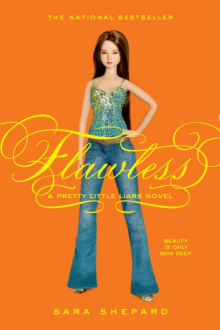 Flawless
Flawless The Elizas
The Elizas Stunning
Stunning Pretty Little Secrets
Pretty Little Secrets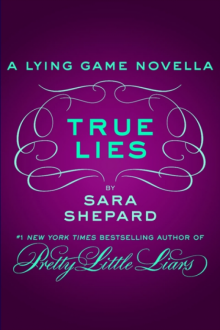 True Lies
True Lies The Good Girls
The Good Girls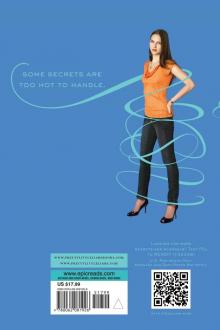 Burned
Burned Perfect
Perfect Pretty Little Liars
Pretty Little Liars Unbelievable
Unbelievable Deadly
Deadly Vicious
Vicious Crushed
Crushed The First Lie
The First Lie Cross My Heart, Hope To Die
Cross My Heart, Hope To Die The Lying Game
The Lying Game Wicked
Wicked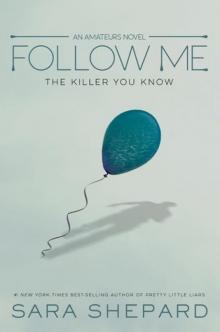 Follow Me
Follow Me Seven Minutes in Heaven
Seven Minutes in Heaven The Perfectionists
The Perfectionists Killer
Killer Twisted
Twisted The Amateurs
The Amateurs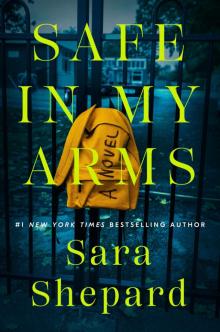 Safe in My Arms
Safe in My Arms Wanted
Wanted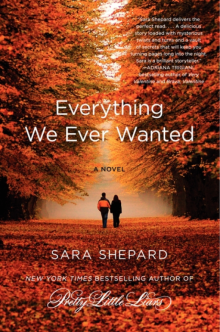 Everything We Ever Wanted
Everything We Ever Wanted Two Truths and a Lie
Two Truths and a Lie The Visibles
The Visibles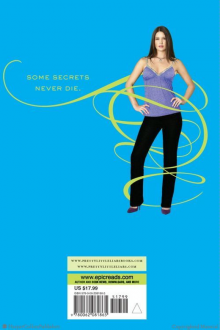 Ruthless
Ruthless Hide and Seek
Hide and Seek The Heiresses
The Heiresses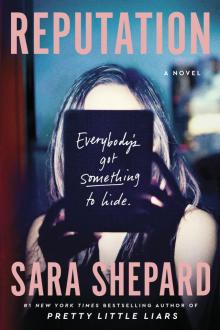 Reputation
Reputation Never Have I Ever
Never Have I Ever Toxic
Toxic Unbelievable pll-4
Unbelievable pll-4 Ruthless pll-10
Ruthless pll-10 Seven Minutes in Heaven tlg-6
Seven Minutes in Heaven tlg-6 Pretty Little Liars pll-1
Pretty Little Liars pll-1 Pretty Little Liars #11: Stunning
Pretty Little Liars #11: Stunning 4.5 The First Lie (the lying game)
4.5 The First Lie (the lying game) The Amateurs, Book 3
The Amateurs, Book 3 Wanted pll-8
Wanted pll-8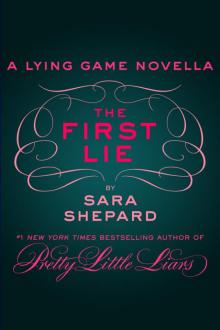 Lying Game 00: The First Lie
Lying Game 00: The First Lie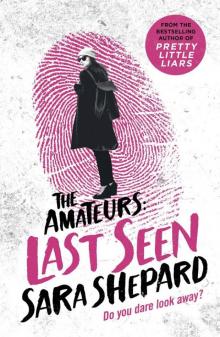 The Amateurs: Last Seen
The Amateurs: Last Seen The Lying Game #6: Seven Minutes in Heaven
The Lying Game #6: Seven Minutes in Heaven Pretty Little Liars #14
Pretty Little Liars #14 All the Things We Didn't Say
All the Things We Didn't Say Stunning pll-11
Stunning pll-11 Heartless pll-7
Heartless pll-7 The Lying Game tlg-1
The Lying Game tlg-1 The Elizas_A Novel
The Elizas_A Novel Perfect pll-3
Perfect pll-3 Burned pll-12
Burned pll-12 Twisted pll-9
Twisted pll-9 True Lies: A Lying Game Novella
True Lies: A Lying Game Novella Pretty Little Liars #9: Twisted
Pretty Little Liars #9: Twisted Two Truths and a Lie tlg-3
Two Truths and a Lie tlg-3 Crushed pll-13
Crushed pll-13 Pretty Little Liars #15: Toxic
Pretty Little Liars #15: Toxic Pretty Little Liars #12: Burned
Pretty Little Liars #12: Burned Killer pll-6
Killer pll-6 Pretty Little Liars 14: Deadly
Pretty Little Liars 14: Deadly